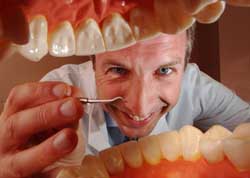How celebs are putting the bite on dentists

Celebrities who spend thousands of pounds perfecting their smile are making image-conscious young adults worry about the health of their teeth, research carried out in Britain and Australia suggests.
Even though statistics show younger generations enjoy better oral health than ever, a study by an international team of researchers led by the University of Newcastle upon Tyne, UK, and the University of Adelaide in Australia, has revealed they are more likely to complain about problems with their teeth and gums than older men and women.
Lead researcher, Professor Jimmy Steele, of Newcastle University’s School of Dental Sciences, believes the underlying reason for the trend is that famous people who indulge in expensive cosmetic dental procedures, such as bleaching, are raising expectations among their admirers about the way their teeth should look and feel.
He says anecdotal evidence from within the dental profession suggests this increases demands on dentists, who say they are already overstretched yet are being placed under additional pressure to perform small miracles.
The findings of the study are published in the current edition of the academic journal Community Dentistry and Oral Epidemiology.
The research team analysed results from major dental surveys carried out in Britain and Australia, which included an element where adult participants aged 18 and over reported their perceptions of the health of their teeth and gums and the impact on their daily life in a questionnaire.
Participants were asked 14 questions, such as ‘how often during the past year have you had painful aching in your mouth because of problems with your teeth, mouth or dentures?’, and were told to rank their answers on a points scale. The higher the score, the worse they perceived the problems to be.
Losing teeth made a big impact on quality of life but once this was taken into account, the lowest total score was reported for the 70 plus age group, meaning they perceived their oral health to have a lesser impact on their quality of life. This is despite the fact that older people usually have more problems with their teeth.
The highest questionnaire score was reported for the group aged 30-49 years, with the participants aged 30 and under getting the second highest score, despite having generally healthier teeth.
Professor Steele said he believed the results reflected the fact that younger generations are increasingly image-conscious.
He added: “You only have to open some of the glossy magazines to see pictures of famous people with perfect, unblemished teeth, or features about cosmetic procedures, such as bleaching. A large number of dental practices are now offering bleaching.
“There is a strong psychological element to health and well-being, and, despite the fact that oral health has been steadily improving over the years, young adults are more likely to believe they have unhealthy teeth and gums because they compare themselves with the high standards set in the celebrity world.
“In my opinion patients have developed unreasonable expectations of their dentist and they are putting increasing pressures on the profession.”
Professor Steele added: “We found the group aged 30-49 years-old had the worst perception of their oral health, possibly because people are more likely to worry about the way they look when they hit 30 and panic about the approach of middle age.”
By coincidence, Baroness Gardner of Parkes is today (Wednesday May 19) due to ask a question in the House of Lords about whether the degree of access for patients to National Health Service dental services is satisfactory.
Media Contact
More Information:
http://www.ncl.ac.uk/All latest news from the category: Social Sciences
This area deals with the latest developments in the field of empirical and theoretical research as it relates to the structure and function of institutes and systems, their social interdependence and how such systems interact with individual behavior processes.
innovations-report offers informative reports and articles related to the social sciences field including demographic developments, family and career issues, geriatric research, conflict research, generational studies and criminology research.
Newest articles

First-of-its-kind study uses remote sensing to monitor plastic debris in rivers and lakes
Remote sensing creates a cost-effective solution to monitoring plastic pollution. A first-of-its-kind study from researchers at the University of Minnesota Twin Cities shows how remote sensing can help monitor and…

Laser-based artificial neuron mimics nerve cell functions at lightning speed
With a processing speed a billion times faster than nature, chip-based laser neuron could help advance AI tasks such as pattern recognition and sequence prediction. Researchers have developed a laser-based…

Optimising the processing of plastic waste
Just one look in the yellow bin reveals a colourful jumble of different types of plastic. However, the purer and more uniform plastic waste is, the easier it is to…



